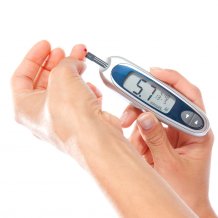Articles

Blood sugar monitor.
Low Psychological resilience predicts future high blood sugars in type 1 diabetes
New research from the University of Exeter and University of Brighton indicates that people who are diagnosed with type 1 diabetes are more likely to manage their condition successfully if they have high levels of psychological resilience.
Managing type 1 diabetes is challenging, with the need to monitor food intake, blood sugar levels and inject insulin regularly. While many manage their condition successfully, others struggle, which can lead to complications.
If clinicians were able to predict which patients are likely to find it harder to manage their type 1 diabetes, they could offer additional targeted support when they are first diagnosed with diabetes.
In the study presented at the Diabetes UK Professional Conference 2022, the University of Exeter team assessed psychological resilience in the StartRight study, funded by the charity Diabetes UK, and the NHS National Institute of Health Research, made up of more than 1,800 people newly diagnosed with type 1 or type 2 diabetes.
The team used a validated questionnaire to assess participants’ resilience, asking them to score 10 questions such as how focused they stay under pressure, and how they adapt to change.
The researchers found that people with type 1 diabetes who had low psychological resilience also had poorer blood sugar control after two years.
First author Dr Simon Brackley, Academic Foundation Doctor at the University of Exeter, said; “We found that a short, validated psychological resilience questionnaire close to diagnosis of type 1 diabetes is predictive of future blood sugar control. We therefore need further studies to find the best way to help these patients, which may be through targeted diabetes support or interventions to improve resilience”.
Joint senior author Dr Angus Jones at the University of Exeter, who co-led the research with, said “Despite progress with technology in recent years living with type 1 diabetes remains challenging. People living with type 1 diabetes need to inject insulin frequently, often needing five or more injections a day, adapted to food and exercise, while carefully monitoring blood glucose. They need to deal with high and low glucose, day in, day out, regardless of whatever else is happening in their lives. Understandably, adapting to the diagnosis of type 1 diabetes can be very difficult, and some people will find it hard to make these changes, possibly due to lack of social support, meaning they run high blood glucose levels and can be at increased risk of diabetes complications. This research shows that a very short questionnaire close to diabetes diagnosis identify people more likely to have high blood glucose in the future. This offers the opportunity to identify those who might benefit most from additional support when they are first diagnosed, to help them adjust to the challenges of managing type 1 diabetes, and prevent complications of diabetes in the future.”
Joint senior author, psychologist Professor Jörg Huber at the University of Brighton, said; “Resilience refers to successful adaptation in the face of adversity such as a diagnosis of type 1 diabetes. Successful adaptation depends on the strengths of the person, but equally on the way help and support can be garnered from all sorts of people, whether these are health professionals, family or social media acquaintances. And likewise help may come in all sorts, from practical advice, information about type 1 to emotional support and encouragement. I believe the so-called ‘resilient person’ frequently is good at benefiting from others. Likewise patients may draw on all sorts of resources to help the process of adaptation and even their next of kin and friends may adapt with them along the way, often by doing simple things such as monitoring blood sugar in the presence of others rather than feeling the need to hide.”
Dr Faye Riley, Research Communications Manager at Diabetes UK, said: “Being diagnosed with diabetes can be a huge shock. Everyone is different and how people cope with a diagnosis will vary. This research, funded by Diabetes UK, highlights how the psychological impact of a diabetes diagnosis is linked to long-term blood sugar management.
“Getting the right emotional as well as medical support at diagnosis is critical but too often emotional support is overlooked. We need further research to unpick the link between psychological and physical wellbeing following a diabetes diagnosis and to establish the types of psychological interventions could help people to manage and live well with their condition.”
Date: 29 March 2022
